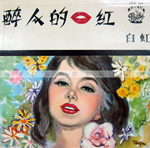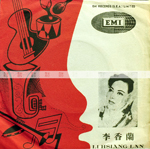In 1949, a whole group of multi-talented stars moved from Shanghai to Hong Kong. Mando pop rose to prominence, rivalling the presence of Canto opera music and Canto pop in a short period of time. The young Wong Jum-sum frequented radio stations and recording studios with his harmonica band members, in that process encountered in person many of these Mando pop stars and maestros, including illustrious names like Li Xian-lan, Bai Guang, Yao li and Yao Min. He also regularly collaborated with Filipino musicians who once illuminated the nightclubs of Shanghai.
These stars and musicians created a reservoir of Mando pop songs in the 1950s. The latter formed an inexhaustible treasure trove for radio music program presenters of the time.

Wong Jum-sum went into studios and radio stations to make music from young. There he met many Filipino musicians who were to pass on to him numerous musical treasures, including the idiom of Shanghai pop and the professional dedication to making good music. Lobing Samson was the one who Wong worked most with in the 1950s, frequently in a Commercial Radio program entitled “A Song to Linger”.
Here we shall play The Dream of Kong Nam, the theme song for the program. From thirty seven seconds into the track, one can hear Lobing Samson played on his clarinet. Wong said Samson’s clarinet sound had an almost perfect resemblance to that of Benny Goodman’s. Here is a dramatic proof.
In 1957, Benny Goodman visited Hong Kong. The two mighty clarinetists rubbed shoulders in this most fascinating place and time we call Hong Kong in the 1950s.
Recommended: Sing Sing Sing

作曲:梁寶耳
作詞:梁寶耳
主唱:梁月玲
歡樂到江南 柳方綠 雨初晴
春遊遇伊人 笑相迎 語含情
願人間仙境 花長好 月長明
惆悵別江南 花半落 月微寒
萬水復千山 人遠隔 不相忘
年年空盼望 別離易 見時難
昨夜夢江南 花憔悴 月殘碎
伊人隨春去 恨如煙 情似水
徘徊傷心地 流不盡 相思淚
相思淚 相思淚












































